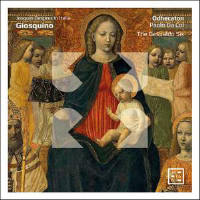Texte paru dans: / Appeared in: |
|
|
Outil de traduction (Très approximatif) |
|
|
Reviewer: Fabrice Fitch ‘Giosquino’ is the title of this album from Italian ensembles, which brings together several works composed during Josquin’s periods of work in the peninsula. As is their custom, Odhecaton perform with several voices to a part, being joined by the English vocal ensemble The Gesualdo Six. Also on board are La Pifarescha, whose members occasionally reinforce the texture, which emphasises the sense of climax at the conclusion of the Hercules Mass; and, for Fortuna d’un gran tempo, the plucked instruments of La Reverdie. Recordings of all these pieces are now plentiful, so it makes most sense to compare like with like – that is, other recordings using an all-male vocal cast. The Hilliard Ensemble’s reading of the Hercules Mass (Erato, 5/90) is muscular, the one by De Labyrintho noticeably gentler; reviewing the latter when it first appeared (Stradivarius, 11/04) I thought it marginally the stronger of the two, but now I’m inclined to prefer The Hilliards’ approach, which is also more consistent as regards tempo. Odhecaton steer a middle course and opt for a bigger sound than either, something of which Ercole himself would have approved (and which is heard to best advantage in O virgo prudentissima and the Salve regina). But in the Mass in particular, this monumentality comes at the cost of the finishing touch in clarity of intention and precision of execution (especially on the top line). Overall, in this most martial of Mass cycles, it is hard to argue with The Tallis Scholars’ account (Gimell, 11/20), which has both virtues in abundance. The decision to evoke Ercole’s chapel is a nice touch but the decision to omit the Miserere, another Ferrarese work with which the Mass is often paired, is all the stranger. Odhecaton are at their best in the motets: the decision to include the added sixth voice in Huc me sydereo and to finish with the 12-voice Inviolata (a work of contested attribution, be it said) plays to the ensemble’s strengths. The instrumental pieces are well managed too: I couldn’t help smiling at the opening lick of La Bernardina, where the sackbut put me in mind of the trombone solo of Stravinsky’s Pulcinella. On a more sombre note, this must be the place to note the passing last April of Liuwe Tamminga, Odhecaton’s longstanding collaborator and titular organist of San Petronio in Bologna for nearly 40 years, to whose memory the recording is dedicated: a great loss, but a precious legacy. |
|




